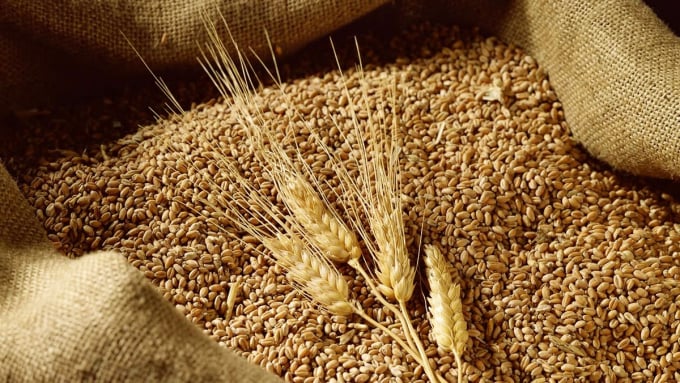June 18, 2025 | 23:54 GMT +7
June 18, 2025 | 23:54 GMT +7
Hotline: 0913.378.918
June 18, 2025 | 23:54 GMT +7
Hotline: 0913.378.918

The MoF proposed to cut down wheat import tariffs from 35% to 0%. Photo: TL.
According to Official Letter No.7672 and the attached Draft, the Ministry of Finance (MoF) said that the statistics of the Ministry of Agriculture and Rural Development (MARD) showed Vietnam has 265 animal feed factories. Recently, Vietnam's feed industry has seen a growth rate of 13-15% per year.
In commercial animal feed production, raw materials account for 80-85% of production costs and mainly depend on imports. Currently, Vietnam spends billions of US dollars every year on importing raw materials for animal feed, mainly corn, soybean and wheat.
In Official Letter No. 09/VIPA dated June 7, 2021, the Vietnam Poultry Association suggested to reduce the raw material import tariff by 50% as 45-50% of large poultry farms were abandoned and around 70-75% of farming households stopped re-herding due to high animal feed prices. If the situation continues in the coming time, the domestic poultry market will face shortage in the fourth quarter.
In addition, the US. Grain Council also asked for cutting MFN (Most-favoured-nation) tariffs on corn and wheat imports to zero. At the meeting in June 23, 2020 with the MoF, the representative of the US Embassy suggested to reduce MFN tariffs of these products to lower the domestic animal feed prices.
According to the provisions of Decree No.57/2020/ND-CP of the Government and the decrees promulgating special preferential import tariff of Vietnam, MFN tax imposed on animal feed is 3%, especially tax on shrimp feed is 0%. Tax imposed on basic raw ingredients for animal feed production is 0%.
Especially, corn (1005.90.90) is imposed a MFN tax rate of 5%, and 5% in relation to WTO rules. Under FTA, the rate is 0% (except for EV agreement, the rate is 3.3% and under CPTPP, the rate is 1%).
Wheat (1001.9999) is imposed a MFN tax rate of 3% and 5% in relation to WTO rules. Under FTA, the rate is basically 0% (except for EV agreement, the rate is 2.5%).
According to the data, 80% of corn kernels Vietnam imported in 2020 are applied MFN duty rates. For wheat, MFN duty rates apply to 45% of the total wheat imports to Vietnam.
Following the Government's direction in Resolutions No. 58/NQ-CP and No. 62/NQ-CP,the MoF submitted to the Government for consideration of reducing MFN tariff on wheat imports for the Code HS 1001.9999 from 3% to 0%; reducing MFN tariff on corn imports for the Code HS 1005.90.90 from 5% to 3%.
According to the MoF, the reduction of MFN tariff on corn imports in general does not have a great impact on the domestic agricultural industry because Vietnam can't cultivate wheat and the domestic corn production are primarily used for human consumption.
Besides, tax reduction in order to lower input costs in the animal feed production will contribute to stabilizing prices; reducing costs in confectionery and food production; thereby, helping enterprises overcome difficulties due to high raw material prices.
Especially, the tax reduction also contributes to maintaining a favorable balance of trade with important trade partners including the United States of America.

(VAN) After 5 years of implementation, the CAI initiative has helped coffee growers change their farming practices, moving toward responsible agriculture that meets global export standards.

(VAN) The primary prerequisite for the comprehensive and robust integration of Vietnam's livestock sector into the global value chain is the establishment of a disease control system.

(VAN) The results of national programs are essential for establishing a contemporary livestock sector that is well-equipped to meet the demands of both domestic and international markets, with robust biosafety standards.

(VAN) The UNESCO Global Geopark revalidation of Non nuoc Cao Bang and the transition to a two-tier administrative model are presently undergoing a pivotal moment in Cao Bang, the northernmost province of Vietnam.
/2025/06/13/5330-2-004539_953.jpg)
(VAN) Changing policy mindset and removing investment barriers are urgent requirements to open up new development space for enterprises in the agricultural sector.

(VAN) The areas include the restoration of five million hectares of marine ecosystems.

(VAN) Dr. Le Van Nguyen, Director of the Institute of E-Commerce Management (ECM), emphasizes the potential for green development through the cultivation of fruit trees, particularly in provinces such as Son La.